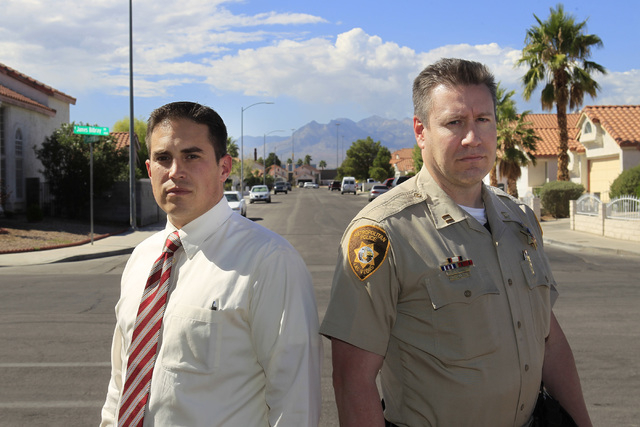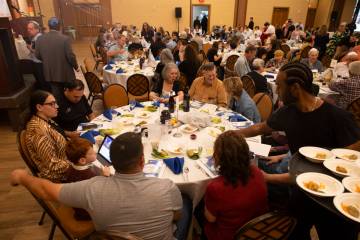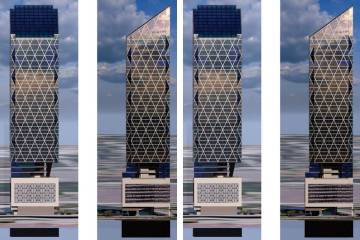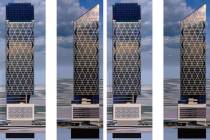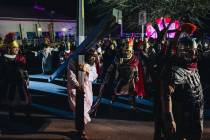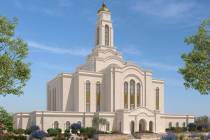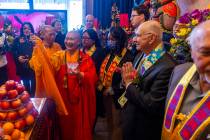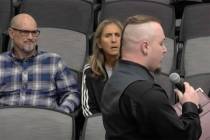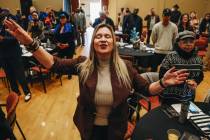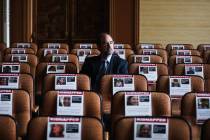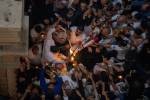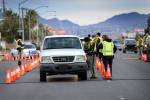PEACE Shield unites police, faith leaders, community
When a shooting or other violent crime takes place in the Metropolitan Police Department’s Northwest Area Command, a dedicated team of religious leaders and law enforcement officials join forces to help those affected by the incident.
PEACE Shield, an acronym for Police and Pastors Effectively Assisting Communities’ Empowerment, consists of 36 faith leaders from local houses of worship who volunteer their time to address crises that take place at all hours of the day or night.
Capt. Christopher Tomaino, bureau commander of Metro’s Northwest Area Command, knows firsthand how often the crises arise and how difficult every case can be.
“We first tried it in the neighborhood near Lake Mead and Martin Luther King (boulevards) and found it to be very beneficial,” says Tomaino, a 20-year veteran of the police department. “It was so well-received that it received an award. Before long, the program spread to other Metro command posts.”
PEACE Shield started about a year ago and is a spinoff of Safe Village, which was developed at the Bolden Area Command by then-captain and current Deputy Chief Gary Schofield. The idea was to involve people who would be welcomed by those affected by a tragedy.
“We didn’t have anything like this before and really needed a cohesive umbrella group that brought everyone together for community outreach,” Tomaino says. “We then got the team going and reached out to the pastors of the local churches for the various geographic communities.
“When we have a critical incident, we can activate those pastors, who go out into the community in different directions to see if people need to talk. It’s the perfect support mechanism.”
Tomaino says police officers appreciate the faith leaders’ help.
“It’s really cool seeing the officers trying to make communities safer,” he says. “Sometimes people simply don’t trust police officers, whereas they will trust a pastor.
“We have managed to get a wide variety of faiths to help us including the LDS (Church of Jesus Christ of Latter-day Saints) church, a mosque, several temples of Jewish faith and a tremendous spectrum of various denominations.”
The religious leaders go door-to-door reaching out to residents of neighborhoods that have been scenes of recent tragedy. Among those participating in the program is the Rev. Steve Beason, associate pastor of International Church of Las Vegas, who also works with Metro’s chaplain program.
“One of my first rides was near Washington (Avenue) and Buffalo (Drive),” recalls Beason, a 19-year valley resident who moved from St. Louis to work as a geologist at Yucca Mountain. “It was at a town house complex with a guy who had a gun to his head. He put the gun to his head, but it was a toy gun.
“You just don’t know, though, when you go into something like this. There are a lot of domestic violence calls, some robberies and times when people will call 911 and hang up.”
Beason remembers when a call came in for a suicide.
“He was a detective,” Beason says. “It was really a tough thing. That sort of thing doesn’t typically happen.”
The Rev. Loren Minnick, associate pastor of Foothills Baptist Church in the northwest valley, belongs to PEACE Shield and finds value in involvement.
“Anytime faith-based groups have the opportunity to engage our community in cooperation with law enforcement, schools or public service, it’s a win-win situation,” Minnick says. “While our focus isn’t necessarily to ‘win one for Jesus,’ our mission is just as important. We help bring stability to troubled communities that have suffered from violent gang-related crimes.
“Our purpose is to make sure people are OK and provide a presence that shows our community that we care.”
He adds that the experience has also opened his eyes to the jobs of the police.
“We have also had the opportunity to get to know our law enforcement officers, and they’re a huge blessing,” he says.
Like other members of the group, Minnick has a particular call that he remembers vividly.
“It was our very first activation call to a gang-related shooting over on Michael Way,” he says. “We arrived on the scene the following day with the COP (Community Oriented Policing) unit to help canvas the area. They went knocking on doors with their own objectives, while Pastor Skyler Parker and I went knocking on doors.
“We approached the area where the shooting had occurred. Bullet holes could be seen in the walls of the apartment building and blood could be seen on the walls of the apartment.”
Minnick says that even with the earlier chaos, residents were eager to speak with them.
“People were home and they responded kindly,” he recalls. “When we told them why we were there, a sense of relief seemed to come over them. Some even gave us a total summation of what they had experienced. All were very glad that we showed up and thankful that someone cared enough to check on them.”
The Rev. Matthew Teis, executive pastor of Liberty Baptist Church, praises the effort and says the work has helped reduce crime in the northwest.
“It’s been really great to work with the people of Metro,” Teis says. “We have been able to be in these needy areas within just a few hours of shootings, murders or stabbings. People come out and hug us and thank us. They build a relationship. Rather than viewing the police as adversaries, they view them as partners in improving their neighborhood.”
Longtime Las Vegas resident Mary Keiser was a crisis counselor from 2002 to 2012. She reported to scenes that included everything from a murder-suicide to a home that had been destroyed when a plane crashed into it in the northwestern valley.
Keiser, who’s now retired, calls PEACE Shield invaluable. She still remembers the calls for bank robberies, car accidents and the rest.
“It’s really time for this,” she says. “You simply cannot have too much awareness and people to help. I can’t tell you how many times people would ask me why these kinds of services aren’t offered more. Most times, companies cut back and don’t include crisis counseling. More than ever before, this sort of thing is needed.”
Keiser says a crisis creates special needs and counselors are important to the recovery of those affected.
“You have to acknowledge the trauma and see what you can do,” she says. “There are so many important elements tied to a tragedy including sleeplessness, hypersensitivity, potential abuse of drugs and alcohol, along with bad dreams. Then, in most cases they need to go back to work.
“Just having someone to talk with and provide comfort is very important. There are so many walking wounded now.”
Metro has similar programs under RECAP, Rebuilding Every City Around Peace. Each individual area command is encouraged to develop its own program.
Further information can be found at https://www.facebook.com/events/1534446420100176/?ref=22



